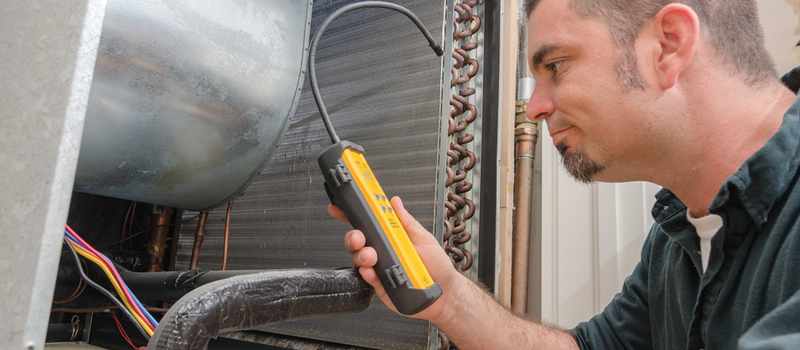AIR CONDITIONING LEAK CHECKS DO YOU COMPLY?
YOUR LEGAL OBLIGATIONS UNDER THE F-GAS REGULATIONS
What are the F-Gas Regulations?
Fluorinated gases (F-Gases) are powerful, man-made gases which stay in the atmosphere for a long period of time and contribute to the greenhouse effect.
HFC’s (Hydrofluorocarbons) are the most common F-Gas and can be found in a range of applications, including commercial & industrial refrigeration, air conditioning systems and heat pump equipment.
Although very efficient and safe for users, most F-Gases have a relatively ‘high global warming potential’ (GWP) and if released can stay in the atmosphere for centuries.
In 2006, the European Union passed the F-Gas regulations in order to reduce the global warming effects of these FGases. These regulations were later revised in 2014, bringing further obligations for both ‘contractors’ and ‘operators’.
What are your obligations?
Anyone with air conditioning installed, deemed to be the ‘operator’ is responsible for having the system leak checked at regular intervals.
Equipment that contains F-Gas above a certain threshold must be at specific set intervals.
As of 2017, these thresholds have changed, where they used to be expressed in the quantity of refrigerant (Kg), they are now based on the CO2 equivalent (tonnes).
This takes into account not only the quantity of refrigerant in the system but also the global warming potential (GWP) of that refrigerant.
How often do you need to have your equipment leak checked?
Up to 5 CO2 (tonnes) – Leak check every 12 months
Up to 50 CO2 (tonnes) – Leak Check every 6 Months.
Up to 500 CO2 (tonnes) – Leak Check every 3 Months.
For example:-
A typical 5kw wall mounted air conditioning system has a base charge of 1.1kg of R410a, this would equate to around 2.3 tonnes of CO2 – requiring a minimum of 1 leak check every 12 months.
A typical 10kw ceiling mounted cassette air conditioning system has a base charge of 3.1kg of R410a , this would equate to around 6.5 tonnes of CO2 – requiring a minimum of 1 leak check every 6 months.
What happens if a leak is detected?
If a leak is discovered during a leak test, it should be repaired as soon as possible. The leak test should then be repeated within 30 days to check the repair has worked.
All engineers which carry out leak testing and repairs on equipment containing HFC refrigerants must hold an F-Gas handling certificate and work for an F-Gas certified company.
Do you need to keep records?
‘Operators’ must ensure records are kept for at least 5 years for all equipment that requires a leak test (i.e. those above the 5 tonnes CO2 equivalent).
These records should include:
- The quantity & type of F-Gas installed.
- The quantity of F-Gas added during installation, maintenance or when repairing a leak
- Details of whether the F-Gas has been recycled or reclaimed
- Quantity of any F-Gas recovered
- Details of those responsible for installing/servicing or decommissioning the equipment
- Details of all leak checks undertaken
- Details of the recovery and disposal of the F-Gas should the equipment be decommissioned.
What are the benefits of leak testing?
Adhering to best practice in leak testing & repairs can significantly reduce refrigerant losses.
Not only will this reduce harm to the environment but will also increase the life and performance of the system.
Can We Help?
At Mattair, we have extensive experience of testing a wide range of equipment for leaks as well as performing the necessary repairs.
Not only will this ensure you are meeting your legal obligations, it will also ensure your system is running to its maximum capacity.
For further information or to arrange a leak test, contact a member of the Mattair Team today on 01246 414922.


